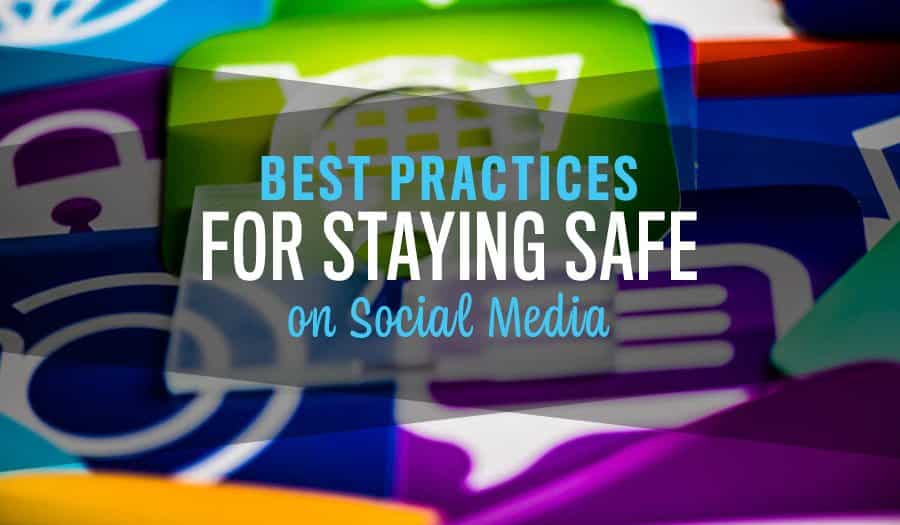Staying safe on social media and protecting yourself online isn’t hard. These 10 simple strategies can help protect your personal information and security.
10 Simple Ways You Can Protect Yourself On Social Media
- Say no to the over-share
- Assume what goes on the internet stays on the internet – permanently
- Keep your friends close, and your enemies blocked
- Click with caution
- Customise privacy – one size does not fit all
- Don’t give away your information
- Don’t bolt the front door and open a side-door
- The domino effect
- Data leakage
- Search yourself
Social media’s connective power enables us to stay in touch with family, friends and colleagues no matter where they are. Unfortunately, it can also open the door to identity thieves, hackers and virus writers. When using social media, either personal or business accounts, it is paramount to keep security and safety in mind, carefully choosing the data you share online.
10 Simple Ways You Can Protect Yourself On Social Media
1. Say no to the over-share
Hackers and identity thieves thrive on information. Posting TMI (Too Much Information) makes you vulnerable to identity theft and a hacker’s dream.
Hackers will often break into financial and other accounts using guessed passwords based on information people have openly shared on their social media accounts.
You may be unaware you are posting the answers to the security questions for your online accounts when you post simple information such as your children’s names, birthdays, or mother’s maiden name. Be mindful of the information you post and the security questions you choose.
Just as you wouldn’t make public that your home was empty while you were away on holiday, you should also avoid posting about corporate getaways or company conferences if your office is left unattended.
2. Assume what goes on the internet stays on the internet – permanently
As they say, ‘Once on the internet, always on the internet, and although posts or accounts may be later deleted, anyone may have already taken a screen-shot or saved images.
Read their privacy policies and how social network sites will use your information. Your information will likely be used to target you with advertising, which is why these sites are usually free.
3. Keep your friends close, and your enemies blocked
Be careful who you accept as a friend on social media. Identity thieves are known for creating false profiles to get information from others. Verify accounts where possible.
Competitors may monitor your business’ social media pages. Some may even troll your page with comments designed to undermine your business. Diligent monitoring of any comments on your social media pages and blogs will be worthwhile.
If you feel someone is threatening or harassing you, do not hesitate to block them or remove them immediately. Follow up with a report to the site administrator. Take screenshots before you delete any comments – you may need these if the problem should escalate.
4. Click with caution
Any links in messages on social media sites should be treated with the same caution as links received in email messages. Don’t assume a message comes from whom it says it’s from. Hackers are adept and sending fraudulent messages that can look like it is from a friend or a customer.
5. Customise privacy – one size does not fit all
Don’t assume the social network’s default settings are the best options for your protection, security and privacy. Instead, configure the options yourself.
6. Don’t give away your information
Some social media sites offer to scan your email address list to connect you to contacts also using the platform. The site may then use these addresses to email your contact list or even contact everyone you have emailed using the email address linked to your account. Avoid giving access to your contacts to social networking sites.
7. Don’t bolt the front door and open a side-door
Many social media sites allow third-party applications to be linked to your page. Hackers may use applications like this to gain access to your personal information. Use the same precautions when downloading anything from the internet when installing third-party social media apps.
8. The domino effect
This may seem obvious, but with busy lives and so many online accounts, it is very tempting to pick a tricky password and then use the same password across multiple accounts. Only one of those accounts must fall prey to a hacker for all your other accounts to be exposed!
Using random passwords unable to be guessed from a quick search of your personal information is vital. Incorporate numbers or characters where you can and download a password manager app to help you keep track.
9. Data leakage
Data loss is a big problem in business and while most incidents are likely to occur via file transfers or email, remember that blog posts, IM chat tools, social media posts and even CV content posted online can all potentially disclose proprietary company information, breaching data security.
If using LinkedIn, it is wise never to post your full CV. Identity thieves can use personal information such as your full work history to apply for loans in your name.
10. Search yourself
A regular Google search of your name may sound vain, but it is the best way to see what information and images you can see. You could also be alerted if someone is falsely using your identity online. While at it, it’s a good idea to search your business name and adjust your privacy settings.
Adopting these ten simple strategies will make you less likely to be easy prey for ill-willed individuals and make your social media experience safer. Stand out from your competition with a Pixel Fish website!
Let Sydney’s leading Web Design Agency take your business to the next level with a Pixel Fish Small Business Website.
Check out some of our latest Website Design projects and Testimonials.
Further Reading:
Getting Started With Social Media
How to Choose the Right Social Media Channels for Your Business
Further Information:
Top 10 Tips to Create The Perfect Website Call to Action
Tips for Creating and Marketing a Financial Services Business Website
Top 10 Unbeatable WordPress Website UX Tips for your business
How to Drive Website Traffic with Podcasting for your business
Digital Branding: How to Create a Logo for your Digital Space
Top E-Commerce Shipping Options to Maximise Sales & Reduce Complexity
10 Social Media Publishing Tools To Streamline Your Content Marketing
The 8 Best Free Online Photoshop Alternatives



